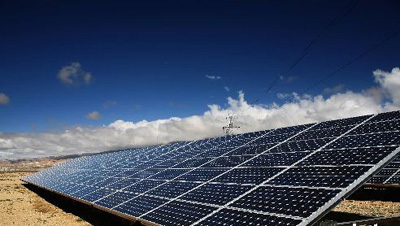
The results of the successful bidding for the second batch of large-scale photovoltaic power plant concessions in the country were announced yesterday. The focus of this bid was: The current reasonable cost of photovoltaic power generation should be between 1.1 yuan and 1.2 yuan, but the bid price of the successful bidder is less than 1 Yuan once even reported a price of 0.7288 yuan, which is almost the same as the current price of household electricity. It is clear that the winning bidder is doing a losing business.
China's Largest Photovoltaic Power Plant Concession Wins Public Results
The newspaper (text/table reporter Li Jianjian, Huang Pei) extended the second half month of the country's second batch of large-scale photovoltaic power plant concession project successful results finally released yesterday, has been subject to the industry's controversial 13 minimum quoted wishful, China Power [1.71 2.40 %] Investment group companies (hereinafter referred to as CPI) have become the biggest winners, but private enterprises have collectively treaded the air.
It is reported that as the concession tender for China's largest photovoltaic power plant so far, the project has involved 13 photovoltaic power plant projects in Shaanxi, Qinghai, Gansu, Inner Mongolia, Ningxia, and Xinjiang in the six northwestern provinces, with a total installed capacity of 280 megawatts.
Adhering to the principle of “the lowest bidder is the successful bidderâ€, the bid price for the second batch of large-scale photovoltaic power plant concession projects in the country is lower than 1 yuan/kWh. The highest price is 0.9907 yuan/kWh, and the lowest price is only 0.7288 yuan/kWh.
The private enterprises participating in the bidding did not win a bid. Zhejiang Zhengtai Solar Energy Technology Co., Ltd., Wuxi Suntech, and Jiangxi Sewei have all survived.
Three years after the ultra-low offer can be achieved
Half of the game, the results did not change. State Power Investment Corporation and other state-owned enterprises won the bid at a price of less than 1 yuan, which has caused controversy in the industry. Is 0.7288 yuan/kWh reasonable? "Since 2007, the production cost of the photovoltaic industry has dropped by approximately 50% in the past few years. Although we do not know what the future trend will be, we have not reached the current price of 0.7288 yuan/kWh." Yesterday, Suntech Solar Power Co., Ltd. Company officials said in an interview with reporters.
Shen Hui, director of the Institute of Solar Energy Research at Sun Yat-Sen University, said yesterday that "the price is certainly at a loss. The current reasonable price should be 1.1 to 1.2 yuan. To reach 0.7 yuan, at least three years later."
Shen Hui believes that even if the sun is relatively abundant in the western region, 1 kilowatt can generate more than 1,500 degrees, which is more than 400 degrees higher than Guangdong, but its price must be around 1 yuan. Some industry experts stated that under the electricity price of 0.7288 yuan/kWh, the project will take at least 20 years to achieve profitability.
Loss is a cumulative quota
Why are Chinese companies such as CPI investing in bidding for capital? "Since the central enterprises are different from the private enterprises, they have more resources and they have advantages in the convenience of the **. Moreover, the share of photovoltaic power generation is not large, and it may not be considered whether they are profitable. They got these projects, on the one hand, they played a demonstration effect. On the one hand, it has made it difficult for many companies to enter this industry.†Yesterday, a photovoltaic company who did not want to disclose his identity said. It is reported that most of the central electric power companies use traditional thermal power as their main business, and the policy requires thermal power companies to have a certain amount of renewable energy power quotas, so the electric power central enterprises are equivalent to their own cumulative quotas.
